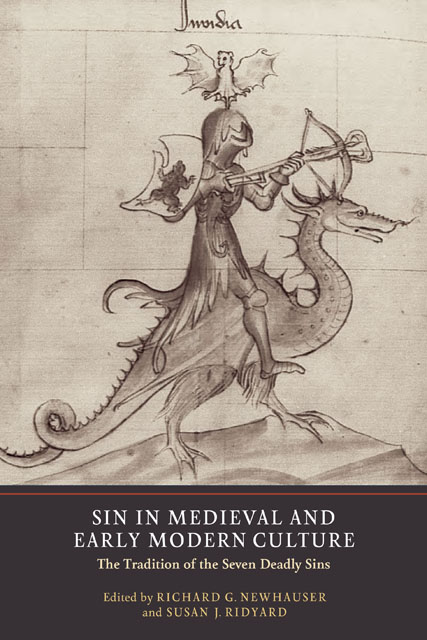4 - Aquinas on the Seven Deadly Sins: Tradition and Innovation
Published online by Cambridge University Press: 28 February 2023
Summary
This essay explores Aquinas’s complex relationship to the tradition of the seven deadly sins. While Aquinas spends a great deal of time exploring each of the sins, in the Summa theologiae he ignores traditional orderings of the sins, completely absorbing them into a largely Aristotelian scheme of the virtues as moderation and vices as excess or deficiency. The shift to this organizing scheme displaces the tradition of understanding the sins in opposition to other groups of sevens (gifts of the Holy Spirit, beatitudes etc.) and mitigates the dualistic and ascetic elements of earlier accounts of the vices. Aquinas’s reassessment of these elements of the tradition is examined by placing his treatment in context with other scholastic treatments of the period and by a consideration of the dominant themes and patterns of that treatment in the Summa theologiae: the relationship between sin and passion, the seven sins as engendering further sins and the ordering of sins as capital rather than in terms of their gravity.
Thomas Aquinas devoted large parts of two major works to the seven capital deadly sins, in the De malo (Disputed Questions on Evil) (seven of the sixteen questions, one question for each of the seven sins), and in the second part of the Summa theologiae, where all seven sins appear and are discussed as ‘capital’ sins. In both works, Aquinas supports Gregory the Great’s account from hiscommentary on the book of Job unequivocally, even to the point that whenever there is a dispute about how to account for the daughters of the sins (there are rival lists of daughters in Isidore and other accounts in Chrysostom and Cassian), Aquinas always affirms Gregory’s account. In the secunda secundae of the Summa theologiae not only is each deadly sin discussed but also many of the daughters are discussed separately as sins, such as backbiting, discord and fraud. Thus, the Gregorian tradition of the sins is a strong presence throughout the account of virtue and vice in the Summa. This is in contrast to some other important figures in the twelfth and early to mid-thirteenth centuries.
For instance, Peter Lombard raises the issue of the seven sins and discusses their ordering but does not consider the particular sins separately or in any depth, and Bonaventure, in his commentary on the Lombard, does no more.
- Type
- Chapter
- Information
- Sin in Medieval and Early Modern CultureThe Tradition of the Seven Deadly Sins, pp. 85 - 106Publisher: Boydell & BrewerPrint publication year: 2012
- 35
- Cited by

